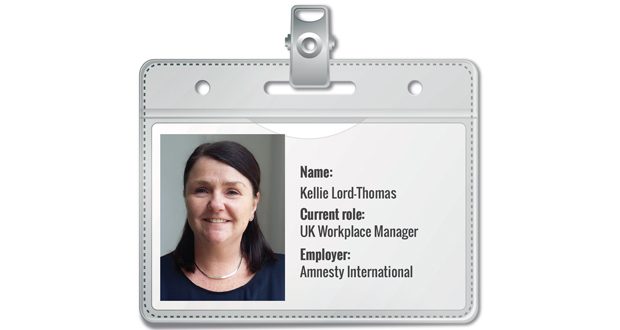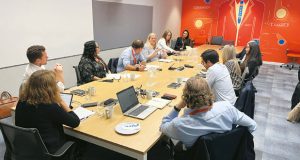Q: How did you progress in FM to your current role?
I stumbled into the world of Facilities when I started working as Receptionist in a multi-tenanted building, a mix of commercial and office space. I quickly realised I wanted to pursue a career in it and I worked my up to Premises Manager.
My next role, my longest, was for a charity who advise business on corporate responsibility. It was here where I learnt of the pivotal role Facilities plays in helping to shape the culture. I used my role to initiate various employee engagement activities to boost morale. Over the years, the role grew from managing the Head Office to all of their UK offices. Once this challenge had been met, I knew it was time to move on. I joined Amnesty three years ago.
Q: What has changed about your job role since the COVID-19 crisis? E.g. home working, furloughed, redeployed?
We closed the office to all staff a week before lockdown and we are all currently working from home. Most staff had already adopted agile working practices but for core services such as Workplace, it is the first time we’ve all worked from home collectively.
Q: What have you found most challenging about your job in FM since the lockdown?
Whilst the technology available has proved to be a game changer in how we stay connected, back-to-back team meetings can be draining. The combination of listening intently, concentration and actively looking at changes in body language can be quite draining. I miss the ability to meet face-to-face. It’s a small price to pay for not having to commute though. I don’t miss the rush to get out of the house each morning to get to work on time. I’m also enjoying attending webinars and trying to understand what impact this will have for the sector going forward.
Q:What qualities do you think are most needed for a successful career in FM?
You need to be organised, an effective communicator and a natural problem solver. You need to have a passion for what you do and to not be easily defeated. You encounter many different situations, some bizarre, and you need to be flexible and be able to respond and lead during these situations. It can be unpredictable at times but that’s what keeps it exciting. It helps to have a good sense of humor and to not take things to heart when dealing with complaints.
Q: What is your organisation doing to ensure the safe return of staff to the workplace?
The first few weeks were focused on identifying who needed better D.S.E and procuring for staff. Now my focus is reopening the building. We are conscious that some staff are in difficult circumstances and we want to provide an alternative space for people to work if they need to. It has been extremely busy, and I can’t see that changing anytime soon.
Q: Are you a member of any FM association or body and if so what benefits do you think they provide?
I am a member of IWFM and became a committee member of WIFM (Women in FM) in January this year. The membership has been invaluable throughout my career, I’ve attended many networking events and met many people I admire within the industry along the way. All have helped shaped my understanding and knowledge of the sector.
Q:Do you believe the pandemic has highlighted the important role of the FM sector and the part its people play in keeping workers safe and buildings clean and maintained?
Absolutely. It’s highlighted the expertise within the sector and the vital role it plays within society and the economy. COVID has highlighted many inequalities and I’m keen the sector actively seeks to ensure key workers are paid adequately and fairly.
Q: What advice would you give to someone coming into the profession now?
Go for it! There are so many interesting opportunities out there. Find learnings in every situation you encounter and don’t be shy to ask questions. Attend networking events and meet other likeminded people who share your passion.
Q: What do you predict could be the main changes to the FM sector due to the impact of the CoronaVirus pandemic?
I see more people being given a choice of where they want to work. The office will still be a vital hub for collaboration and interaction, but it will be less desk based than before. Lots of organisations will be rethinking their workplace strategies and reviewing lease options.
Mazin Daoud – a Fire Engineer for Sodexo UK & Ireland has been supporting NHS Property Services with fire risk assessments for numerous COVID-19 field hospitals and wards across England and Wales.
Daoud explains: “Initially I was approached to write a standard operating procedure for fire safety risk assessments in COVID-19 field hospitals, but due to my knowledge of the risks posed by the oxygen supplied to all the ventilators, I was asked to assist with the hospital at the ExCeL, London.
“After completing this I offered my services to the lead for healthcare fire safety in Wales and was asked to prepare the fire strategies for two new Nightingale field hospitals and two new COVID-19 wards (within an existing hospital) for the Swansea and Vale University Health Board.”
While each field hospital and ward had similarities, Daoud had to provide different solutions to ensure patients had the maximum time to escape if a fire did develop.
“The main difference for each assessment was the level of dependency for the patient. Those recovering are more able to evacuate themselves, while with patients on ventilators just the process of moving them in the event of a fire is potentially life threatening.
“Low ceiling buildings required using fire engineering to provide solutions such as automatic vents to exhaust the smoke and heat from a fire, while high ceiling buildings provide plenty of space for smoke and fire to travel vertically which reduces the risk of horizontal spread.”
Once his fire risk assessments were completed they were provided to the authorities, the NHS and to the local fire service so that each body has a thorough understanding of the systems provided and the emergency procedures and plan.
He adds: “Everyone working on these projects has worked ceaselessly, sometimes under very difficult conditions and to amazing time frames, to complete them to a high standard. This really has made me feel very humble.”





